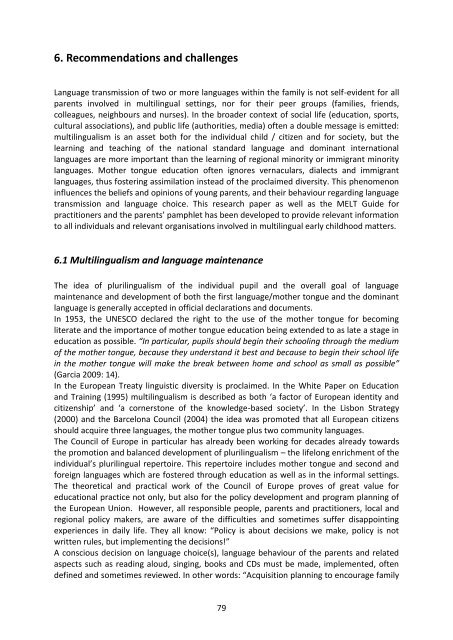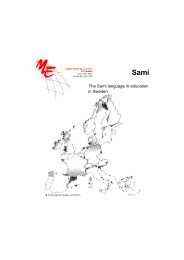Multilingual Early Language Transmission (MELT) - Mercator ...
Multilingual Early Language Transmission (MELT) - Mercator ...
Multilingual Early Language Transmission (MELT) - Mercator ...
You also want an ePaper? Increase the reach of your titles
YUMPU automatically turns print PDFs into web optimized ePapers that Google loves.
6. Recommendations and challenges<br />
<strong>Language</strong> transmission of two or more languages within the family is not self-evident for all<br />
parents involved in multilingual settings, nor for their peer groups (families, friends,<br />
colleagues, neighbours and nurses). In the broader context of social life (education, sports,<br />
cultural associations), and public life (authorities, media) often a double message is emitted:<br />
multilingualism is an asset both for the individual child / citizen and for society, but the<br />
learning and teaching of the national standard language and dominant international<br />
languages are more important than the learning of regional minority or immigrant minority<br />
languages. Mother tongue education often ignores vernaculars, dialects and immigrant<br />
languages, thus fostering assimilation instead of the proclaimed diversity. This phenomenon<br />
influences the beliefs and opinions of young parents, and their behaviour regarding language<br />
transmission and language choice. This research paper as well as the <strong>MELT</strong> Guide for<br />
practitioners and the parents’ pamphlet has been developed to provide relevant information<br />
to all individuals and relevant organisations involved in multilingual early childhood matters.<br />
6.1 <strong>Multilingual</strong>ism and language maintenance<br />
The idea of plurilingualism of the individual pupil and the overall goal of language<br />
maintenance and development of both the first language/mother tongue and the dominant<br />
language is generally accepted in official declarations and documents.<br />
In 1953, the UNESCO declared the right to the use of the mother tongue for becoming<br />
literate and the importance of mother tongue education being extended to as late a stage in<br />
education as possible. “In particular, pupils should begin their schooling through the medium<br />
of the mother tongue, because they understand it best and because to begin their school life<br />
in the mother tongue will make the break between home and school as small as possible”<br />
(Garcia 2009: 14).<br />
In the European Treaty linguistic diversity is proclaimed. In the White Paper on Education<br />
and Training (1995) multilingualism is described as both ‘a factor of European identity and<br />
citizenship’ and ‘a cornerstone of the knowledge-based society’. In the Lisbon Strategy<br />
(2000) and the Barcelona Council (2004) the idea was promoted that all European citizens<br />
should acquire three languages, the mother tongue plus two community languages.<br />
The Council of Europe in particular has already been working for decades already towards<br />
the promotion and balanced development of plurilingualism – the lifelong enrichment of the<br />
individual’s plurilingual repertoire. This repertoire includes mother tongue and second and<br />
foreign languages which are fostered through education as well as in the informal settings.<br />
The theoretical and practical work of the Council of Europe proves of great value for<br />
educational practice not only, but also for the policy development and program planning of<br />
the European Union. However, all responsible people, parents and practitioners, local and<br />
regional policy makers, are aware of the difficulties and sometimes suffer disappointing<br />
experiences in daily life. They all know: “Policy is about decisions we make, policy is not<br />
written rules, but implementing the decisions!”<br />
A conscious decision on language choice(s), language behaviour of the parents and related<br />
aspects such as reading aloud, singing, books and CDs must be made, implemented, often<br />
defined and sometimes reviewed. In other words: “Acquisition planning to encourage family<br />
79



